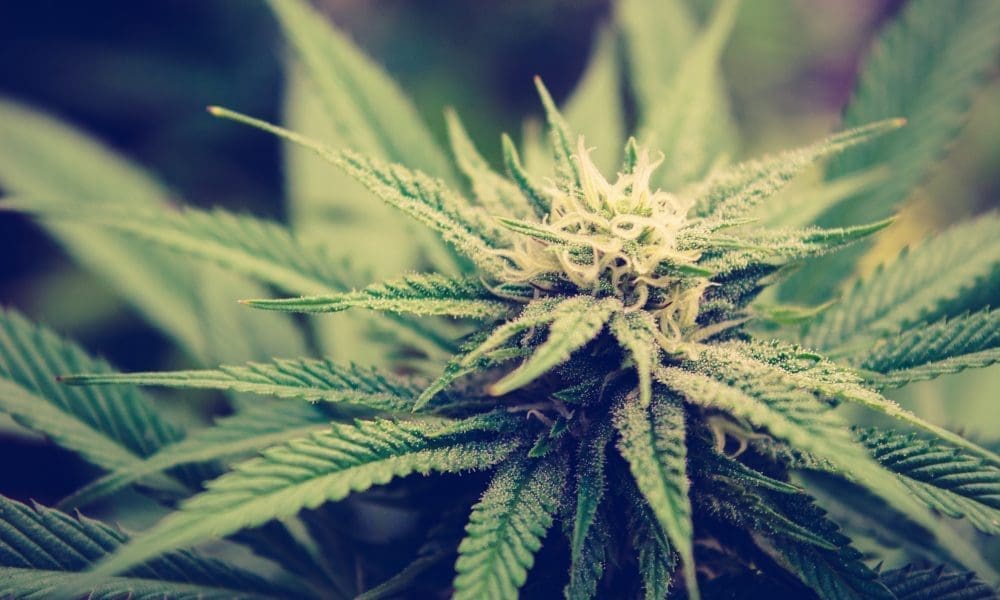Amid a smattering of recent court cases across the country casting doubt on the constitutionality of the federal government’s blanket ban on firearm possession by marijuana users—a law known as Section 922(g)(3)—the U.S. Supreme Court is set to privately discuss in September whether to take up a pending case that centers on the statute.
According to the high court’s docket for the case, U.S. v. Cooper, the matter has been distributed to justices for consideration in a private conference on September 29. An appeals court panel previously dismissed a three-year prison sentence against the defendant, who was convicted for possession of a firearm while being an active user of marijuana.
The development comes as at least two separate but similar cases wait in the wings. One, U.S. v. Baxter, involves a defendant found in possession of both a firearm and a bag of marijuana. The government charged him under 922(g)(3), which prohibits gun ownership by “unlawful” users of controlled substances.
The U.S. Department of Justice (DOJ) has repeatedly asked the court for more time to decide whether to seek review of an opinion in that case from the U.S. Circuit Court of Appeals for the Eighth Circuit, which ruled the gun ban might be unconstitutional as applied to the defendant.
Most recently, justices extended the government’s deadline to July 3 to file an appeal in that case—a deadline that’s come and gone without any new documents being posted to the docket.
Asked by Marijuana Moment about the status of the solicitor general’s reply in Baxter, a DOJ public affairs representative replied on Thursday: “No comment, thanks.”
Separately, the federal government is asking the Supreme Court to review a different case involving the firearm ban, U.S. v. Hemani, arguing that “Section 922(g)(3) complies with the Second Amendment.”
“That provision targets a category of persons who pose a clear danger of misusing firearms: habitual users of unlawful drugs,” says a filing from U.S. Solicitor General D. John Sauer.
In Cooper, which justices are set to discuss amongst themselves in September, Sauer earlier this month asked that the court hold off on deciding whether to review that case until the Hemani dispute is resolved.
One reason DOJ could be focused on the high court taking up Hemani in particular is that the defendant in that case is not only a cannabis user but also a user of cocaine who’s sold drugs in the past, according to court findings, which could make him less sympathetic in the eyes of the court. Defendants in the other cases were merely found in possession of both a firearm and marijuana.
Lawyers for the defendant in Hemani argued in a brief earlier this week that the high court should decline the case.
“With no circuit split and the limited scope of the summary affirmance below, this case is not an appropriate procedural vehicle for seeking this Court’s review,” they wrote. “The petition for writ of certiorari should be denied.”
If the Supreme Court takes up Hemani and declares 922(g)(3) constitutional, such a ruling could could mean government wins in the remaining cases.
A number of federal courts in recent months have cast doubt on the legality of 922(g)(3), finding generally that while the ban on gun ownership among drug users may not be entirely unconstitutional, there’s scant historical precedent for such a broad restriction of Second Amendment rights on an entire a category of people.
As a recent report from the Congressional Research Service explained the current legal landscape, a growing number of federal courts are now “finding constitutional problems in the application of at least some parts” of the firearms prohibition.
In a ruling earlier this week, for instance, a three-judge panel for the U.S. Court of Appeals for the Eighth Circuit vacated a defendant’s conviction and remanded the case back to a district court, noting that a retrial before a jury may be necessary to determine whether cannabis in fact caused the defendant to be dangerous or pose a credible threat to others.
The new Eighth Circuit opinion appears to differ from a recent Third Circuit ruling in that the new decision says that not every application of 922(g)(3) “require[s] an individualized factual determination,” explaining that such determinations wouldn’t be necessary if the government could demonstrate that a particular drug made an entire class of users dangerous.
By contrast, the Third Circuit earlier this month said in a published opinion that district courts must make “individualized judgments” to determine whether 922(g)(3) is constitutional as applied to particular defendants.
The appeals panel ruled that while a person “need not have harmed someone, threatened harm, or otherwise acted dangerously to justify his disarmament,” the history of gun laws in the country requires that “district courts must make individualized judgments and conclude that disarming a drug user is needed to address a risk that he would pose a physical danger to others.”
Judges in that case noted that historical restrictions on gun ownership under “drunkenness and lunacy laws” in the U.S. “were still always based on an ‘individualized assessment’ rather than a categorical judgment.”
In 2024, the Supreme Court issued a ruling in U.S. v. Rahimi, a case having to do with firearm possession among people subject to domestic violence restraining orders. Justices subsequently remanded a number of pending cases back to lower courts for reconsideration, including U.S. v. Daniels, which centered on the federal gun prohibition for cannabis consumers.
When the Daniels case was first heard by the U.S. Court of Appeals for the Fifth Circuit, judges declared the gun restriction unconstitutional. After the Supreme Court remanded the case back to the Fifth Circuit, the appeals court in a January opinion again took issue with the statute, explaining that while 922(g)(3) wasn’t unconstitutional on its face, it was unconstitutional as applied to a defendant who was only an occasional cannabis user.
The Fifth Circuit’s Daniels ruling came on the heels of a string of other judicial decisions casting doubt on the legality of the ban.
Earlier this year, a federal judge in Rhode Island ruled that the ban was unconstitutional as applied to two defendants, writing that the government failed to establish that the “sweeping” prohibition against gun ownership by marijuana users was grounded in historical precedent.
A federal judge in El Paso separately ruled late last year that the government’s ongoing ban on gun ownership by habitual marijuana users is unconstitutional in the case of a defendant who earlier pleaded guilty to the criminal charge. The court allowed the man to withdraw the plea and ordered that the indictment against him be dismissed.
Another panel of judges, on the U.S. Court of Appeals for the Tenth Circuit, heard oral arguments in November in the government’s appeal of a district court ruling that deemed the gun ban unconstitutional.
In a number of the ongoing cases, DOJ has argued that the prohibition on gun ownership by marijuana users is also supported by the Rahimi decision that upheld the government’s ability to limit the Second Amendment rights of people with domestic violence restraining orders.
DOJ has made such arguments, for example, in favor of the firearms ban in a case in a case in the U.S. Court of Appeals for the Eleventh Circuit. In that matter, a group of Florida medical cannabis patients contends that their Second Amendment rights are being violated because they cannot lawfully buy firearms so long as they are using cannabis as medicine, despite acting in compliance with state law.
DOJ under President Joe Biden consistently argued that medical marijuana patients who possess firearms “endanger public safety,” “pose a greater risk of suicide” and are more likely to commit crimes “to fund their drug habit.”
It remains unclear how the Trump administration will approach the cases. At a NRA conference in 2023, Trump suggested there might be a link between the use of “genetically engineered” marijuana and mass shootings. He listed a number of controversial and unproven factors that he said at the time he would direct the Food and Drug Administration (FDA) to investigate as possibly causing the ongoing scourge of mass shooting afflicting the country.
“We have to look at whether common psychiatric drugs, as well as genetically engineered cannabis and other narcotics, are causing psychotic breaks” that lead to gun violence, he said.
DOJ has claimed in multiple federal cases over the past several years that the statute banning cannabis consumers from owning or possessing guns is constitutional because it’s consistent with the nation’s history of disarming “dangerous” individuals.
In 2023, for example, the Justice Department told the U.S. Court of Appeals for the Third Circuit that historical precedent “comfortably” supports the restriction. Cannabis consumers with guns pose a unique danger to society, the Biden administration claimed, in part because they’re “unlikely” to store their weapon properly.
Last year, Biden’s son Hunter was convicted by a federal jury of violating statute by buying and possessing a gun while an active user of crack cocaine. Two Republican congressmen challenged the basis of that conviction, with one pointing out that there are “millions of marijuana users” who own guns but should not be prosecuted.
The situation has caused confusion among medical marijuana patients, state lawmakers and advocacy groups, among others. The National Rifle Association’s (NRA) lobbying arm said recently that the court rulings on the cannabis and guns issue have “led to a confusing regulatory landscape” that have impacted Americans’ Second Amendment rights.
“Marijuana use is no longer limited to the domain of indigenous religious customs or youth-oriented counterculture and now includes a wide variety of people who use it for medicinal or recreational reasons,” said the advocacy group, which does not have an official stance on cannabis policy generally. “Many of these individuals are otherwise law-abiding and productive members of their communities and want to exercise their right to keep and bear arms.”
Meanwhile, some states have passed their own laws either further restricting or attempting to preserve gun rights as they relate to marijuana. Recently a Pennsylvania lawmaker introduced a bill meant to remove state barriers to medical marijuana patients carrying firearms.
Colorado activists also attempted to qualify an initiative for November’s ballot that would have protected the Second Amendment rights of marijuana consumers in that state, but the campaign’s signature-gathering drive ultimately fell short.
As 2024 drew to a close, the ATF issued a warning to Kentucky residents that, if they choose to participate in the state’s medical marijuana program that’s set to launch imminently, they will be prohibited from buying or possessing firearms under federal law.
The official said that while people who already own firearms aren’t “expected to” turn them over if they become state-legal cannabis patients, those who “wish to follow federal law and not be in violation of it” must “make the decision to divest themselves of those firearms.”
Since then, bipartisan state lawmakers have introduced legislation that would urge Kentucky’s representatives in Congress to amend federal law to clarify that users of medical marijuana may legally possess firearms, though no action has since been taken on that bill.
Kentucky Gov. Andy Beshear (D) said in January that he supported the legislature’s effort to urge the state’s congressional delegation to call for federal reforms to protect the Second Amendment rights of medical marijuana patients, but the governor added that he’d like to see even more sweeping change on the federal level.
“I think the right way to deal with that is not just to focus on that issue, but to change the schedule of marijuana,” Beshear said at a press conference. “What we need to change is the overall marijuana policy by the federal government.”
Photo elements courtesy of rawpixel and Philip Steffan.






















































